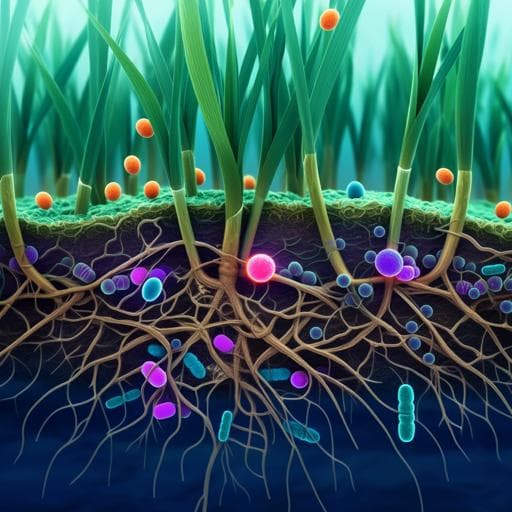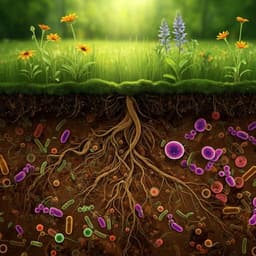
Agriculture
The response of wheat and its microbiome to contemporary and historical water stress in a field experiment
H. Azarbad, L. D. Bainard, et al.
This field experiment highlights how 37 years of water stress history impacts wheat's microbial community, revealing that plant development stage and historical conditions are crucial under contemporary stress. Conducted by Hamed Azarbad, Luke D. Bainard, Asmaâ Agoussar, Julien Tremblay, and Etienne Yergeau, this research suggests that microbial-based strategies could enhance plant stress resistance.
~3 min • Beginner • English
Introduction
Climate change is increasing the frequency and severity of drought, which threatens global food security by reducing crop yields. Plant-associated microorganisms can enhance plant resilience by improving nutrient uptake, suppressing pathogens, and modulating plant stress physiology. Plant microbiomes assemble via vertical (seed) and horizontal (environmental) transmission, with soil and seed microbes being major contributors. Long-term exposure of soil microbiomes to water stress can shift communities toward drought-tolerant taxa, potentially influencing plant performance under subsequent stress. Prior lab work using soils with differing water-stress histories suggested that historical water stress can benefit wheat growth under equal contemporary conditions, but seed microbiomes could not be evaluated in that setting. Genotype and plant developmental stage further modulate microbiome assembly and drought responses. Research question and hypothesis: The study tests whether 37 years of contrasting soil water-stress history leads to distinct microbial communities across wheat compartments, and how these differences interact with contemporary irrigation (water stress), plant genotype, and plant developmental stage. The authors hypothesized that soil legacy effects would result in different microbiome assemblies across plant compartments, with distinct responses to contemporary water stress, genotype, and growth stage, and that seed microbiomes would also reflect these effects.
Literature Review
The authors synthesize prior findings showing: (1) plant microbiomes assemble via both vertical (seed) and horizontal (environmental) transmission, with soil and seed microbiota being key sources; (2) microbial exposure to water stress selects for taxa with enhanced stress tolerance (e.g., osmolyte and EPS producers), shifting community composition; (3) previous work by the team demonstrated in controlled conditions that soil water-stress history constrains wheat-associated microbiomes under short-term water stress; (4) plant genotype and root exudation influence microbiome recruitment and can favor drought-tolerant microbes that reciprocally improve plant drought responses; (5) plant developmental stage drives successional changes in plant-associated microbial communities and functions. Gaps identified include limited understanding of how historical soil water stress and plant genotype interactively shape microbiomes across plant compartments and stages in field conditions, and how these factors influence seed-associated microbiomes.
Methodology
Design and site: Field experiment at two adjacent agricultural fields (Swift Current, Saskatchewan, Canada) with 37 years of contrasting irrigation regimes (since 1981): one field irrigated during wheat phases (without water stress history; without WSH) and the other not irrigated (with water stress history; with WSH). Fields are on a continuous wheat–fallow two-year rotation. Fertilization rates historically differed between fields based on soil tests (e.g., in 2018: without WSH 239 lbs/ac N:34-P:17; with WSH 34 lbs/ac N:34-P:17). Pre-experiment soil physico-chemical properties were analyzed.
Experimental setup: In May 2018, 32 plots (1 m × 3 m) were established in each field (total 64 plots). Within each field, half the plots were irrigated and half non-irrigated; four randomized blocks were nested within each irrigation treatment. Four wheat genotypes were sown on May 14, 2018: drought-tolerant AC Barrie (Triticum aestivum) and Strongfield (T. turgidum subsp. durum), and drought-sensitive AC Nass (T. aestivum) and AC Walton (T. aestivum). Seeds were untreated (no surface sterilization or chemical/biological treatment).
Irrigation and measurements: Irrigation (25.4 mm per event) was applied on June 19 and subsequently on June 21, 28; July 6, 10, 13, 16, 19, 23, 25, 27, 31; August 2, 7, 9. Soil water content (SWC) measured May 23 (pre-irrigation) and August 1 (six weeks after irrigation start). Leaf relative water content (LRWC) measured June 21 (two days after irrigation start) and August 1.
Sampling scheme: Bulk soil: four 0–10 cm cores between rows per plot, pooled, at three plant stages: post-emergence (May 23), early stem elongation (June 21), early dough (August 1): 64 plots × 3 stages = 192 samples. Rhizosphere, roots, and leaves: four subsamples per plot at early elongation and early dough, pooled per plot: 64 plots × 3 compartments × 2 stages = 384 samples. Plants were excavated to ~50 cm to collect intact roots; rhizosphere obtained by brushing soil firmly attached to roots; roots rinsed with sterile water; leaves collected with sterile forceps. Seeds were harvested at physiological maturity (August 25 for with WSH; September 11 for without WSH) with care to avoid cross-contamination between irrigation treatments. Yield (plot grain weight), 1000-kernel weight, and seed protein (InfraLUM FT-12) were measured. Four non-irrigated plots in the without WSH field with excess moisture were excluded from all analyses.
Molecular methods: Seed epiphytes and endophytes, soil and plant compartment DNA were processed for amplicon sequencing (details in Supplementary Methods). Eleven seed endophyte samples failed 16S amplification; for 16S, 32 of 53 seed endophyte libraries were excluded due to low depth; thus, seed bacterial endophyte data were largely omitted from statistical models.
Statistics: Analyses performed in R 4.0.3. Linear mixed-effects models (lme4) run separately per field history with fixed effects of Irrigation × Genotype × Developmental stage and random effect of Block (nested in irrigation); for seed data, Developmental stage was not included. Fixed-effect significance assessed by Type II ANOVA with Kenward–Roger df (lmerTest); random effects by LRT. Alpha diversity (Shannon) computed (otuSummary) and analyzed with LMMs. Community structure visualized by PCoA (Bray–Curtis, vegan); PCoA axes 1 and 2 analyzed with LMMs. Taxonomic composition analyses focused on dominant bacterial and fungal phyla/classes and orders; LMMs followed by paired t-tests for pairwise contrasts. Effects of field history on soil chemistry tested by ANOVA.
Key Findings
Water status and agronomic traits: Irrigation significantly increased soil water content by August 1 in both fields (treatment validation). LRWC increased strongly under irrigation in the without WSH field after six weeks, but less so in the with WSH field. Yields were generally higher in the without WSH field; yields decreased under non-irrigation in both fields, with sharper declines in the without WSH field. Genotype effects were significant: drought-sensitive genotypes (AC Nass, AC Walton) had higher yields than drought-tolerant (AC Barrie, Strongfield). Kernel weight and seed protein were primarily genotype-driven: Strongfield had the highest kernel weight and notably higher protein, especially under non-irrigation; AC Nass had the lowest protein in irrigated plots of the with WSH field.
Alpha diversity: Seed epiphytic bacterial diversity was higher for drought-sensitive genotypes but only in the with WSH field. Conversely, seed epiphytic fungal diversity was higher for drought-tolerant genotypes. Developmental stage significantly affected bacterial Shannon diversity in rhizosphere, roots, and leaves. In the with WSH field, rhizosphere bacterial diversity was higher at stem elongation than at dough, while the opposite pattern occurred in the without WSH field. Root bacterial diversity was higher at dough than stem elongation in both fields; leaf bacterial diversity was higher at stem elongation. Fungal Shannon diversity was strongly stage-dependent across bulk soil, rhizosphere, roots, and leaves (except leaves in with WSH field): rhizosphere and roots had higher fungal diversity at dough; leaves in without WSH had higher fungal diversity at stem elongation.
Community structure: Plant compartment strongly structured communities; seed epi- and endophyte communities clustered closer to leaves than to other compartments. Field water-stress history and developmental stage were major drivers of both bacterial and fungal community structure across compartments. For seed bacterial epiphytes, PCoA axis 1 separated communities by field history, with an irrigated-to-non-irrigated gradient along axis 2. Seed epiphytic fungi were partially separated by field history and by genotype (more pronounced in seeds from the without WSH field). Irrigation significantly affected rhizosphere communities in the without WSH field (bacterial axis 1 and fungal axis 2), but had limited effects in the with WSH field; irrigation effects on leaves were more pronounced at the dough stage and for fungal communities in the without WSH field.
Taxonomic composition: Gammaproteobacteria proportions were significantly higher in roots, leaves, and seeds than in rhizosphere and bulk soil at all stages. Field history effects were clear: Actinobacteria were more abundant in bulk soil, rhizosphere, and leaves from the with WSH field than from the without WSH field (p < 0.001, t-tests). Seed bacterial epiphytes from the with WSH field had higher Firmicutes (notably Bacillales) than those from the without WSH field (p = 0.007); rhizosphere showed the same Firmicutes enrichment under WSH (p < 0.001). For fungi, seed epiphytic Ascomycota were higher in the without WSH field than in the with WSH field (p = 0.005), including higher Pleosporales (p < 0.001); Basidiomycota showed the opposite pattern (p = 0.005). Developmental stage significantly influenced Firmicutes in rhizosphere, roots (p < 0.001), and leaves (p = 0.002). In the with WSH field, rhizosphere Actinobacteria were higher under non-irrigation than irrigation, especially at the dough stage (significant Irrigation × Stage interaction). Zygomycota were higher at stem elongation than at dough in rhizosphere and roots (p < 0.001). In the without WSH field, rhizosphere Ascomycota were higher under non-irrigation at the dough stage (significant Irrigation × Stage interaction), with higher Dothideomycetes, Coniochaetales, and Sordariales; leaf Ascomycota were higher under non-irrigation at both stages.
Overall: Plant developmental stage and long-term field water-stress history were the dominant factors shaping microbiomes across compartments; seeds acquired distinct microbiomes within a single generation depending on historical contingencies, modulated by contemporary environment and genotype.
Discussion
The study addressed whether long-term soil water-stress history, contemporary irrigation, genotype, and plant developmental stage shape wheat microbiomes across compartments, including seeds. Results show that plant stage and historical water stress are the primary determinants of microbiome diversity and structure in bulk soil, rhizosphere, roots, leaves, and seeds. Seeds acquired distinct epiphytic communities within a single generation that reflected field history and were further modulated by irrigation and genotype, supporting the view that soil/seed microbial pools exert strong historical contingency on plant microbiome assembly. Field history also mediated contemporary irrigation responses: rhizosphere communities in the historically irrigated field (without WSH) were more responsive to irrigation than in the historically stressed field (with WSH). Enrichment of Actinobacteria and Firmicutes (Bacillales) under historical water stress aligns with known drought-tolerance traits (e.g., robust cell walls, spore formation) and reported enrichment under dry conditions. Developmental stage effects likely reflect shifts in plant exudation and tissue environments as plants age; genotype effects may involve traits beyond drought tolerance (e.g., disease resistance), particularly influencing leaf-associated fungi. Agronomically, higher LRWC and yields in the without WSH field under irrigation coincided with generally higher fungal alpha diversity, consistent with reports of beneficial fungal contributions to plant water status and productivity. Together, findings underscore that both legacy (historical) and contemporary water regimes, coupled with host factors, jointly shape plant-associated microbiomes and may influence seed-associated microbial inheritance, with potential implications for breeding and microbiome engineering strategies.
Conclusion
Historical and contemporary soil water stress, plant genotype, and developmental stage interact to determine bacterial and fungal community diversity, structure, and composition across wheat compartments. Notably, historical environmental conditions alter seed epiphytic microbiomes within a single generation. These insights highlight the importance of legacy effects in shaping plant microbiomes and suggest opportunities to integrate microbiome-informed strategies into breeding for stress resilience. Future work should test whether stress-mediated alterations in seed (epi- and endophytic) microbiomes confer benefits to the next plant generation under water stress and extend validation across multiple sites and soil histories.
Limitations
Key limitations include: (1) the field history treatment relied on two adjacent long-term fields with differing irrigation histories and historically different fertilization rates, a unique setup that limits replication and may confound history with abiotic differences (e.g., organic matter, phosphorus, texture); (2) direct manipulation or replication of soil history across multiple sites was not feasible; (3) seed endophyte analyses were limited due to 16S amplification failures and low sequencing depth, restricting inferences about seed endophytic bacteria; (4) slight differences in harvest timing between fields reflect differing stress/maturity and may introduce stage-related variation; (5) while many soil properties were similar (e.g., pH, CEC, and NO3-N), some differed and could contribute to observed patterns.
Related Publications
Explore these studies to deepen your understanding of the subject.







